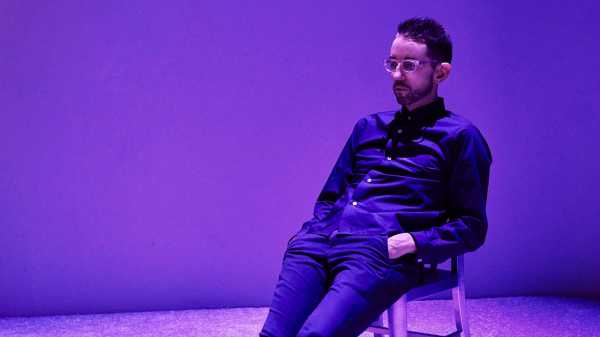
Last fall, at the Cherry Lane Theatre, the comedian Neal Brennan performed a one-man show about his own alienation, much of it self-imposed. He wore fashionable sneakers, glasses with clear frames, a lapel mike, and a button-down shirt buttoned all the way to the top. “I’m clearly liberal,” he said, a few minutes into the ninety-minute show. “Look at me. Bone-thin.” He paused for laughter—a bit more of it than he seemed entirely comfortable with. “But I don’t feel like part of the group, because liberals are the least welcoming people on the planet. You can believe the right shit, but if you don’t express it the right way. . . .” He trailed off, as if searching for an example. “You ever try to talk about transgender issues in public?” A palpably tense silence filled the room. “See, even right now, you’re, like, ‘We don’t gotta do this, Neal.’ ” And, surprisingly, he didn’t. He turned the joke into a meta-joke, leaning, like any good liberal, on his own guilt and ambivalence. And then he moved on.
A version of the one-man show, trimmed to an hour and directed by the genre-transcending magician Derek DelGaudio, was just released as a Netflix special called “Blocks.” The name might be a play on the language of therapeutic self-diagnosis (as in “mental block”), but it also refers, more literally, to the show’s basic conceit. Brennan stands before a wall of toy-like blocks, which represent “the areas of my life that make me feel like something’s wrong with me,” and turns them over in his hands, using them as prompts for various bits: money, Twitter, gun control, Kanye West. “People are, like, ‘That guy’s fucking crazy,’ ” Brennan says in the special, which was filmed when West was an erratic Trumpist but not yet an open anti-Semite. “He’s a rapper. Since when do you rely on rappers for their emotional stability?”
In the Netflix special, the meta-joke about “transgender issues” remains mostly unchanged, except that, after “We don’t gotta do this, Neal,” Brennan adds a new tag: “Don’t go out like your boy.” This is an allusion to Dave Chappelle, who became Brennan’s friend and writing partner thirty years ago, when they were both nineteen. Together, they wrote the cult-classic stoner movie “Half Baked,” in 1997; a few years later, they co-created “Chappelle’s Show,” the sketch program that still serves as a touchstone for a generation. “That’ll probably be the top thing on my résumé forever, for better or worse,” Brennan told me. “I’m proud of some of what I’ve done since, but, to this day, ‘co-creator of “Chappelle’s Show” ’ is the thing that someone can say about me and everyone else in the room will go, ‘Okay, no further questions.’ ” One of the highlights of “Blocks” is a bravura humblebrag: a set piece about a time when Brennan was invited to a Netflix party along with Eddie Murphy, Ellen DeGeneres, Chris Rock, and about a dozen other comedy A-listers, and how being in that room both boosted and gutted his confidence.
Brennan and I spoke at a café in the West Village, and then again in October, over the phone, when he was back home in West Hollywood. At one point, our phone connection cut out, and he called me back over FaceTime. In my experience, most people have an easier time being candid when the visual component of a call is stripped away; with Brennan, who has spent thousands of hours divulging his secrets to strangers, FaceTime seemed to make him, if anything, even more unguarded. Our conversations have been edited for length and clarity.
Let’s start with Kanye. Obviously, you’ve been doing this show for a long time, and you did not plan to release it around a Kanye news peg.
Certain things you fear are going to go out of fashion, or out of the news cycle, but Kanye is sort of evergreen. To me, he’s the biggest—if not the biggest cultural contributor in the last twenty years, then one of the biggest. My basic idea was about how liberals digested him: they loved it when he was against George W. Bush, but once he was for Trump then it was like, “Can you shut the fuck up?” Obviously, it has since gotten way darker than that. I mean, it’s like the YouTube or Facebook algorithm came to life within him. I think he wanted freedom as a Black man to express something other than the boilerplate, prescribed point of view. And now he’s way outside the box. The thing is: the good thing about boxes is that they can contain things. And when you’re that far outside the box, your shit’s all over the street. It’s sad, but he is almost a perfect object lesson, or metaphor, for our last fifteen to twenty years.
When you said “our last fifteen to twenty years,” I thought at first that you meant the last fifteen to twenty years that we have left as a species.
[Laughs.] Also maybe that.
O.K., well, if he’s an object lesson, then what do we take from it?
That I don’t think we can handle all this exposure. I don’t think human beings can take this much exposure to information, and this much exposing of our own information. The ingoing and the outgoing. I told somebody, “In some ways, I’m glad Beethoven’s dead, so that I don’t have to wake up to Beethoven saying that QAnon had some good ideas.”
I don’t know. I really think social media plus COVID was too much. We got overpowered. All the information that we’re all ingesting all the time—it just overwhelms us.
In your own act, how do you know when to listen to your own inner voice, even if it’s contrary to the herd, and when to step back and go, Oh, I’m way off here? And just to be clear: you don’t have a bit in your act where you talk about how the Jews control the media and run the world.
[Laughs.] I mean, it’s silent. But it’s in there.
[Laughs.] But do you have any version of that, where you feel like you’re getting close to a third rail, or where you’re feeling the audience get nervous or pull away from you? How can you tell the difference between “I’m charting new territory” and “I’m off base and I will regret this later”?
With racial stuff, I have a good jury of people who will watch and respond.
Do you have an example of a racial joke that you cut because the jury wasn’t into it?
Yeah, the Black-church thing. [In the stage version of the show, but not in the Netflix special, there was a bit comparing “Black church” with “white church.”] I cut it for two reasons. One of them is just, like, comedy level of difficulty. I wouldn’t be the first person to say that Black church is different from white church. And the other is that the person who told me to cut it is a comedy icon.
This is one of those situations—is it more awkward to drop the name or not drop the name?
I mean . . . Chris [Rock] told me to cut it. There was one line in it that Ezra Edelman [the director of the documentary “O.J.: Made in America”] told me to cut a year ago, and I did. And then Rock saw it and was, like, “Nah, just cut the whole thing.”
Because he didn’t think it was funny enough?
It was just a little . . . this is where you get into, like, “I know it when I see it.” I couldn’t even tell you exactly why. It’s sort of like “The Blues Brothers.” That scene where they go into the Black church—I mean, it’s basically blackface, right? You don’t know that as a kid. You just think they’re cool and weird.
What about your jokes about gender? Do you have a jury of your peers for that too?
Is there a Chris and Dave equivalent, you mean?
Yeah, do you have, like, Ali Wong and Amy Schumer and—
No, but I know they’re gonna see it. And I don’t want Ali or Schumer or any of these people to think I’m a hack, or to think I’m, like, a bigot against women. I don’t want them to think that I’m a worse sexist than they are.
It’s hard to make comedy that doesn’t have a shelf life, particularly when you’re pressing on potentially third-rail stuff. I assume you don’t want to look back at something you’ve made and find that it aged badly, the way you’re talking about with “The Blues Brothers.” So how do you try to account for that in the present, thinking about what it might look like in the future?
I’m not a big posterity guy. I’m not a big legacy guy. Especially in the new-media age—if this special’s incredibly well received, that’ll mean maybe ten days of attention. Even I—as somebody who loves comedy, is obsessed with comedy—I don’t watch Richard Pryor and George Carlin very often.
Onstage, you talk about feeling socially alienated.
I’ve been in comedy since I was eighteen. I don’t have any school friends. I dropped out of school. You know, my college friends are—it ends up being the icons. It’s, weirdly, a lot of the people at that Netflix party. I just have a weird existence. Like, Dave Chappelle is my college friend. It sounds like I’m name-dropping, and maybe it’s also that, but it’s not chiefly that. I may never be able to escape it. There’s this built-in hostility to me because people think I’m a tag-along. People watch my specials and go, “Not as good as Dave,” and I’m, like, “Yeah, no shit.” So when people say “Stop bringing it up,” I’m, like, “I’m not—it’s brought.”
Since you mentioned Dave Chappelle: obviously, he has said things, especially about trans people, that have caused a lot of outrage. What is it like to be associated with him these days?
I’m not going to disavow him, because he’s my friend. It’s a thing we did that is still somehow on Netflix and trending and all that shit. It’s like if James Dean was also still alive. I don’t agree with some of the shit in his act. I didn’t agree with some of the shit on “Chappelle’s Show,” and vice versa.
What do you not agree with?
I don’t want to itemize it. You can probably guess. And, by the way, I bet he doesn’t dig a lot of my shit.
Another way of approaching it is: when is it just a disagreement—which, sure, lots of people disagree with lots of things—and when is it, like, “O.K., this is unacceptable”?
Right.
Because with Eddie Murphy, for example, you look back at some of those specials—some of the greatest standup specials ever, otherwise—and they’re shockingly, horrifyingly homophobic.
Yeah.
It makes it so that I can’t watch them.
Right. Skip chapter one.
And it’s not like I just have a disagreement with him. It mars his legacy. And it has a moral dimension to it. So then the question becomes: when is it, “Oh, he disagrees with me, I disagree with him,” and when is it, “I find this immoral”?
The truth is, I don’t know. Because the other thing [with Dave] is: we’re both almost fifty. So what am I going to say to him? You know what I mean? “I object!” Well, the clay is pretty settled at this point.
I’ve heard people say, “If you don’t like it, do your own special.” Which is fine as far as it goes, but then, obviously, there are lines somewhere—if Netflix were airing “Richard Spencer’s White Christmas Special,” you wouldn’t say, “Go make your own special.” You’d be, like, “Yeah, people should fucking boycott that.”
Right. There’s also the question of: are you a better friend if you’re supportive or if you’re critical? And I still don’t know. I still don’t know. Sometimes I’ve erred on both sides. I don’t even know if I’ve erred. I’ve chosen both sides. I’ve chosen a lot of times to push.
Like many people, I’m of about seven different minds about this. One of them is that I think the country and the Constitution is set up to balance the extremes: freedom and security. You can say anything you want, as long as it doesn’t get to physical harm. Now people are saying that speech is violence. I want to do a joke—I tried it once, didn’t work for me—that goes, “Anyone who thinks that speech is violence has never been punched in the face.”
Well, I think there are a few things mixed in there. One is that there are power gradients. So an armed agent of the state is not equivalent to a kid on a corner. Another thing is: there’s the Constitution and there’s laws, and then on the other hand there’s “I don’t like what you said on Netflix, I’m going to boycott you.” And those aren’t equivalent either. So I wonder if sometimes there’s an overapplication of constitutional principles to things that aren’t really in that sphere of life.
No, I know. “I think you should be able to say whatever you want.” “Okay, what about blackface?” I don’t think there’s anyone who’s reasonable who would defend that. So, then, when does something cross the Rubicon into blackface territory?
Earlier in your career, you got in trouble for using the N-word in your act.
It was a dumb thing to say.
Do you regret it in the sense of “I regret that I did that because it’s a big headache for me now,” or do you—
No, I regret it because it’s creating a problem for a group of people that have so many fucking problems that they don’t deserve. And then to be, like, “Well, here’s one more. I found a loophole that allows me to create one more.” You know what I mean? It’s just embarrassing.
How did you come to the position of “Actually, this thing that I very decisively, publicly did—I have now changed my mind”?
Well, the good and bad news of being neither famous nor unknown is that it’s not a huge deal. It’s just a thing that’s out there and I wish I didn’t do it. Not because . . . it was a kind of quadruple-irony joke about my Black friends calling me that word, so at the time it seemed like fair game.
You could have dug your heels in and defended it, as many people do.
I think it’s the least people in power can do. It’s almost the definition of the bare minimum. “Don’t say this word.” “All right.” That doesn’t seem that hard to me.
I think artists should be able to edit their shit. You know what I mean? The same way they edit a joke that doesn’t work, doesn’t get a big enough laugh. There’s got to be some jury process, even within your own mind. I think you should be free in your first draft. You should be able to fuck around at the Cellar. But, after that, after you put it out into the world, I think people can criticize you all they want. It’s one of those dichotomies: speak your truth and live with the consequences, but, also, you’re a social animal that needs connection. I want to be able to say whatever I want to say, but also I have a glass jaw and I want total approval from everyone. And maybe that’s, like, the new human condition.
I don’t fucking know. Am I a moral scholar? Nope. Just a fucking guy.
You’ve mentioned that name-dropping—or what you sometimes call star-fucking—is another thing about you that people find alienating. What do you think is alienating about that?
You and I had it in this interview. I can tell you the name, the person who told me to drop the Black-church joke, or I can be vague and uninformative. I can tell you the name and seem like I’m a climber, or I can say “a friend” and it’s way less informative, and less true.
How did you develop this new special?
I had about an hour of material, and I looked at all of it, like, What am I getting at with these jokes? And what I was getting at was just entirely self-defense. I feel like an aberration. I feel like an outlier. I feel unacceptable. Like, I’m not married. I don’t have kids. That’s huge. I don’t really drink, don’t really smoke weed—huge. Don’t eat meat—kind of weirdly huge. Just a pain in everyone’s ass. And then, ideologically, I don’t fit in.
I looked back at the jokes I had, and what they added up to was a person who was really defensive and felt kind of bad about who he is and felt the need to yell about it. To preëmptively defend himself. And then—this is an embarrassing confession, but you never know where ideas are gonna come from—I was watching Halsey on “Saturday Night Live.” And Halsey sang and made a painting. And I was, like, It would be cool to do standup and a second thing onstage, and it would be cool if that thing tied into the arc of the show, or was additive to illustrating the point. And by this point I was friends with Derek DelGaudio, whose show “In and Of Itself” does, I guess you would say, illusions that are metaphorical. What he does is technically magic, but it’s so elevated that it’s a higher—it’s a better cut.
How do you think about whether comedy can be or should be artful, or artistic?
I’m coming from a place of—I did an hour special for Comedy Central [in 2013]. I thought it was pretty good. Had some good jokes in it. America, and show biz, seemed to be indifferent to it. And I was, like, Well, I don’t think I should just do another hour, because that doesn’t seem to be enough from me to move the needle. There are lots of people that can. Or, well, I should say: there are lots of people that do. And maybe, if I’m being generous, twenty-five of them are enough, just standing onstage talking. And, if I’m being less generous, I’d say eight of them—and they know who they are—can just stand onstage and talk, and that’s a full enough meal.
Chris and Dave and Louis [C.K.] and Jim Jefferies and [Bill] Burr and [John] Mulaney and Ali and Schumer and Wanda [Sykes] and Sarah [Silverman]—that’s more than eight, so I just contradicted myself—they can just stand onstage. And they are enough just doing a press-conference standup special. Here’s the mike. I’m going to talk into the mike.
So Derek and I have an ongoing conversation about how to do shows that are more than just a press conference. Bo [Burnham], Jerrod [Carmichael]—I think those guys are of the same mind, too, which is: this can be more than a press conference. I think at one point while I was in rehearsals I texted Bo and Jerrod a picture of the set, like, “I hope you’re happy.”
“Rothaniel,” and “Inside,” and, hopefully, my specials, and “Nanette,” and [Mike] Birbiglia’s specials, and Hasan [Minhaj]’s specials and Derek’s specials—I’m sure there’s somebody I’m forgetting—they’re doing something else besides the press conference.
In your new special, and also on podcasts and social media, you talk a lot about how much time and effort you’ve put into various forms of self-improvement: therapy, meditation, antidepressants, ketamine, ayahuasca, transcranial magnetic stimulation. First of all, do you call it self-improvement?
I would say it’s an ambition. At a certain point, my ambition went from “I want X career achievement” to “I want to feel good most of the time.” Because all the career stuff, I was just using that as a way to feel good in my body, or in my existence. I am isolated. I do want to be more like everybody else. Like, I long for connection. Like everybody.
I did ayahuasca maybe a dozen times during COVID. Ayahuasca is a beautiful experience. I had a rough one, but it’s mostly been really beautiful.
In the show, you say, “I used to be an atheist, but now I’m agnostic about my atheism.”
Ayahuasca is the reason I’m not an atheist. The third time I did ayahuasca, I was an atheist, and I opened my eyes and said, “Oh, I’m in the presence of God right now.”
Do you have any self-consciousness about being the L.A. guy who’s into New Age stuff and drinks your spirulina smoothie in the morning and all that stuff?
I mean, this speaks to the outlier thing. I know I’m that, and I also find it completely nauseating. I’ve been wearing an ayahuasca anklet for the last year and a half, and I write dick jokes. If I’m known for anything, it’s, like, cynical. Not, like, “Hey, this is my life partner, Spirit Willow.” And yet Spirit Willow is a person I know. I know a woman named Spirit Willow, and I call her Spirit Willow. And I do Corona commercials. So, yeah.
What do you want to do next?
I have a new forty-five or fifty minutes of material, so I can tour, which I intend to do. If there’s a way to turn that into a theatrical standup special, or elevated standup special, or whatever the term is—then it hasn’t presented itself yet. So I don’t know. I think I have to wait and see what Halsey does. ♦
Sourse: newyorker.com






